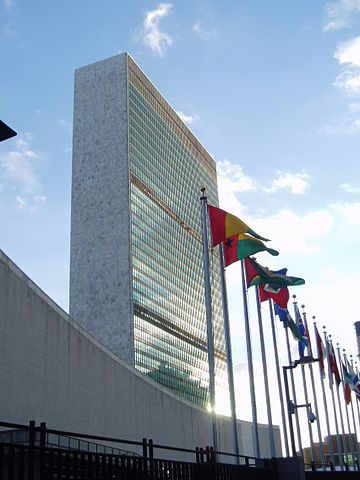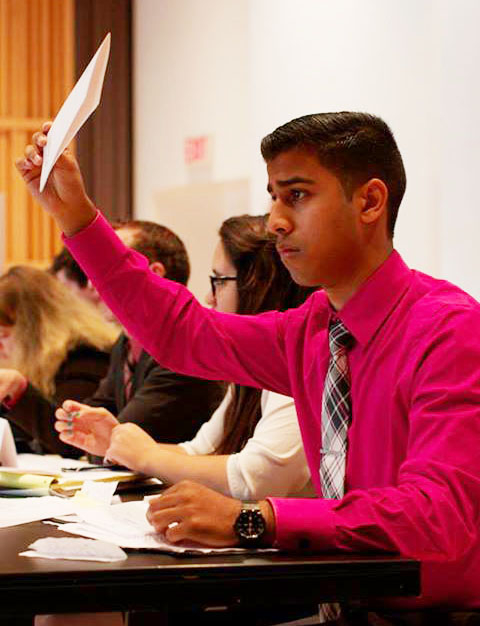Problem Solving Prowess Places Rutgers University Association of International Relations 10th on Model UN Circuit
Skills employed as team members continue to serve alumni in their careers

'From invasions to war to student protests, we can discuss virtually anything'– Philip Kehoe
Members of the Rutgers University Association of International Relations (RUAIR) are competitors at heart. They have to be, annually vying for the attention of new arrivals on the New Brunswick Campus at a university that hosts about 400 student organizations.
But on the collegiate North American Model U.N. circuit, RUAIR is far from unknown. The Rutgers contingent ranks No. 10 among roughly 250 universities that compete at conferences meant to “solve” the world’s problems or extinguish hot spots.
“We hold our own against elite universities like Chicago, Georgetown, Harvard, McGill, Pennsylvania and Yale,” says association President Atif Jalal Ahmad, naming several major rivals on the BestDelegate.com Model U.N. circuit. He credits the honed leadership, research, analytical and presentation skills of Rutgers delegates that regularly earn judges’ certificates of achievement and their committee chair’s gavel as Best Delegate. He adds that immediate past Head Delegate Danial Manzoor and Evan Gottesman, the current head delegate, were named to the 2013-2014 North American College Model U.N. All-Star team.
Skills employed as team members continue to serve alumni in their careers, Ahmad says. One works with the chair of the Senate Committee on Foreign Relations, another with the U.S. Comptroller of the Currency while a third is employed by the International Monetary Fund. Ahmad, a junior from Bangladesh, who is past treasurer and also has handled group operations including budgeting, lodging and transportation besides being a frequent competitor, believes law school is in his future.
Though competing in Model U.N. – with interesting road trips from Morningside Heights in Manhattan to Montreal – is RUAIR’s most visible activity, members regularly attend weekly Tuesday night meetings. The executive board, under Ahmad’s guidance, meets Sundays to discuss potential co-sponsorships of events with campus partners, such as the Center for European Studies, and to choose a discussion topic for the following Tuesday’s open meeting in Murray Hall. Twenty to 40 students usually attend the sessions run by Communications Director Philip Kehoe, a senior environmental policy and journalism major from Swedesboro, N.J., who learned about the association as a sophomore after attending a Student Involvement Fair.
“From invasions to war to student protests, we can discuss virtually anything,” says Kehoe, a 14-time delegate and former president. He describes the discussions as “open, relaxed and diverse, allowing for opinions to be expressed freely and calmly.”
The stakes soon will be raised, however, when Gottesman, as head delegate, conducts a tryout and practice sessions for fall competitions, three of which – hosted by Columbia, Yale and Georgetown – are scheduled before Halloween. The four-day conferences comprise an opening ceremony, two days of increasingly intense committee meetings and General Assembly sessions where delegates employ team-building skills, seek amiable solutions to crises and prepare attendant resolutions, as well as social events and an awards presentation.
“The tryout will model a U.N. committee, not necessarily a topic and scenario that actually will come up, but one that will test an individual’s skills, such as public speaking and negotiating,” Gottesman says. “Model U.N. is set up as a social event, for convincing people or reaching a compromise or some kind of resolution.

“Delegates need the ability to step into another person’s shoes and act according to their assigned roles,” he continues. “Research plays a big part in preparation. For instance, as a member of a ruling body of a government, you might be charged with carrying out some action, possibly one with which you disagree. You have to play your part accurately and understand the cultural norms of that government.”
Gottesman, a sophomore majoring in history and minoring in international studies, believes the membership’s diversity, both in personal backgrounds and academic majors – not everyone majors in political science – facilitates role play. “Take, for instance, the Ebola virus [scenario],” he says. “Being a poli sci major won’t necessarily help you to fully understand the crisis, but someone like Phil [Kehoe], with a background in environmental policy, or a biology or premed major will bring a different perspective.”
Already involved with a new RUAIR initiative as a commentator for its Worldview website, Gottesman, who contemplates a career with a think tank or an international affairs publication, also is preparing a new research guide that he hopes will become part of Model U.N. training. “People come with different skills, but we can teach them the rules and procedures at conferences,” he says. “If they can familiarize themselves beforehand with how the conferences are run, they can better concentrate on their presentations.”
Performance and preparation are keys to making the traveling team, not necessarily seniority. “We remind our senior members that they don’t automatically qualify,” says Ahmad, the president, diplomatically. “We often give newcomers a chance to gain experience as a way to maintain high interest in the group.”
For information about the Rutgers University Association of International Relations, contact President Atif Jalal Ahmad at atif.ahmad93@gmail.com or Head Delegate Evan Gottesman at gottesman.evan@gmail.com.